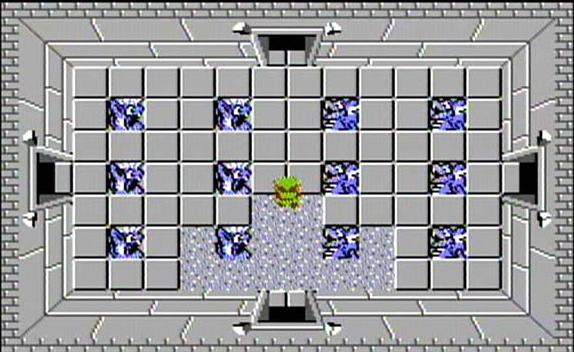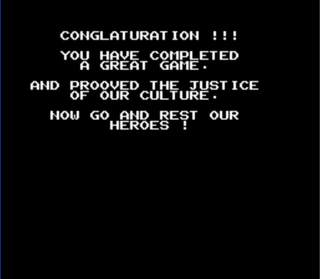Another key tool to dealing with ADHD -- exclusively available to video games -- is learning to perceive things in layers. The world as we see it was created gradually, over lots of time. Video games aren't like that; some programmer actually had to create the background, then the objects, then the sprites.

Perceiving a new stimulus from a video game design perspective helped me a lot. Say I step into a crowded party; immediately, all of the sights and sounds overwhelm me... and I get really confused. So I look at the floor, then the walls. That's my background. Next, I look at the objects in the room. Then, I am able to take in the "sprites" (also known as "people" in real-life). The same thing applies to sound, although the process mirrors video game creation much less: I take in the background noise, then I'm able to understand the questions and conversations being directed to me. Usually, one such question is "Why are you looking at the walls?"
3. Self-Esteem
I was a decent student; in fact, that would probably be one of my strong suits. Still, ADHD constantly got in the way. I would come up with a great science fair idea, then get confused and forget to bring half the ingredients. I'd get a girl interested in me, but then ask her out with my shirt buttoned up all lopsided. I definitely had an "I can't do anything right" mentality before video games taught me otherwise. Games allowed me to execute projects to completion, and the reason they facilitate this goal so well is twofold. First of all, they're designed to make people feel good (after all, it's entertainment, not reality); second, they allow the opportunity to repeat a mistake many times.

Applying this concept to my life was tougher, but ultimately quite rewarding. We all experience times where we make the same mistake over and over again. For instance, that last sentence originally had like five typos. For me, the key is to recognize situations where I can make mistakes, and differentiate them from the times where I only get one chance. Not only did games teach me to prepare (and anticipate) important events, they also instilled in me the confidence to know I could probably handle said events when they arrived. I owe that entirely to video games.
Please understand one important thing, though: Nothing about video games has actually improved my ADHD at all. It still ravages my brain as much as it did on the day I was born -- only now, I've discovered lots of tools to help me deal with it. Video games simply count among those tools.
Conversely, NASA's developed a new video game technology that allegedly decreases the symptoms of ADHD in kids. Basically, NASA's created a video game that measures how often the "concentration" sections of the brain are active; the more active they are, the better the video game plays (cars go faster, etc.). Basically, it's a carrot-and-stick mechanic. This snake oil machine handily illustrates my point: You don't "fix" ADHD.
From where I'm sitting, these kinds of studies miss the entire point. Bottom line: A fundamental and genetic part of my brain simply doesn't work right. I can no more fix ADHD with "concentration practice" than quadriplegics can cure themselves with "walking practice." On the same note, excessive "seeing" doesn't make someone go blind. If someone is blind, "seeing" practice won't help.
In addition, I am not concerned with the correlation between ADHD and high amounts of game-playing during youth. The world drowns my senses; comparatively, video games are a slice of serenity (and it's always been this way). If we start focusing on using video games as teaching tools for negotiating life with ADHD -- instead of regarding them as mythical bringers of disease -- then we have so much potential to unlock... and we might not have such a problem with rampant ADHD misdiagnoses. Of course, then we'd have to take responsibility for our own children's problems -- so that will never happen.
Evan Hoovler also writes for Playboy's The Smoking Jacket and Blastr. He co-wrote the National Lampoon book "Pimp It Yourself," and wants to be your Facebook friend.
For more information on ADHD, Evan recommends "Driven To Distraction : Recognizing and Coping with Attention Deficit Disorder from Childhood Through Adulthood," by Edward Hallowell and John Ratey.


